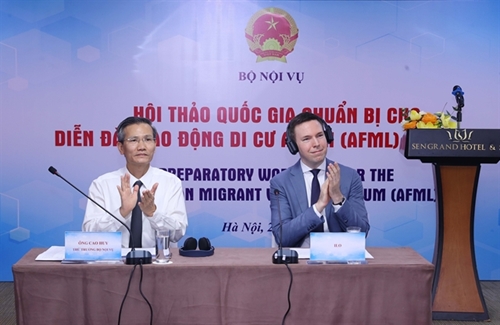The Ministry of Home Affairs is the national focal point for ASEAN labor cooperation and a member of the ASEAN Committee on the Implementation of the ASEAN Declaration on the Protection and Promotion of the Rights of Migrant Workers (ACMW).
    |
 |
|
Deputy Minister of Home Affairs Cao Huy (L) and ILO's representative Felix Weidencaff co-chair the workshop on August 25 in Hanoi. |
The workshop brought together representatives from research institutes, international organizations, U.N. bodies and laborer sending enterprises. The International Labor Organization (ILO) office for Asia and the Pacific also joined the event online.
Deputy Minister of Home Affairs Cao Huy said Vietnam possesses an abundant and industrious labor force. In 2024, the workforce aged 15 and above totaled 53 million, including nearly 24.7 million women. More than half a million Vietnamese are currently working overseas under contract.
Vietnamese workers are now present in 43 countries and territories, with strong growth in key markets such as Japan, the Republic of Korea and Taiwan (China). Opportunities are also opening in Australia, New Zealand, Germany, Canada and Finland.
However, Huy acknowledged that Vietnamese workers face stiff competition due to gaps in technical skills, foreign language ability and professionalism. He stressed that protecting the rights of migrant workers - both outbound and inbound - while strengthening training and human resources development remains a national priority.
Vietnam has been improving domestic policies to safeguard the rights of foreign workers and Vietnamese laborers abroad. These efforts include enhancing training quality and skills development, promoting human resource policies, and deepening regional and international cooperation, particularly through ACMW activities.
As an active member of the Association of Southeast Asian Nations (ASEAN), Vietnam has fulfilled its commitments with initiatives recognized at both regional and international levels. These include a study on ASEAN laws and policies governing migrant labor, guidelines on gender mainstreaming in labor and employment policies, and regional research on reintegration support for returning migrant workers. Such initiatives aim to boost the skills, competitiveness and resilience of the regional workforce in the face of global shifts.
He expressed his hope that the workshop would allow delegates to review Vietnam’s follow-up to previous AFML recommendations and exchange views on the implementation of the Sustainable Development Goals, particularly SDG 8 on decent work for all and SDG 10 on safe, orderly and responsible migration.
According to the ILO, the 18th AFML will take place in Kuala Lumpur, Malaysia, on September 9–10, under the theme “Accelerating action towards the SDGs on safe migration and decent work for migrant workers in ASEAN.”
The ILO's representative Felix Weidencaff commended Vietnam’s commitment to AFML, noting that while labor migration supports economic growth and cultural diversity, challenges remain in ensuring fair benefits for both migrants and host communities.
At the workshop, participants reviewed Vietnam’s implementation of recommendations from AFML 17 and discussed two priority topics for AFML 18: safe working conditions and protection from forced labor, and lowering recruitment and remittance costs. The inputs will help shape ASEAN’s efforts to promote safe migration and decent work for migrant workers in line with the SDGs.
The AFML, held annually under the ACMW framework and hosted by the ASEAN Chair, produces recommendations that guide national and regional actions to promote and protect migrant workers’ rights.
Source: VNA